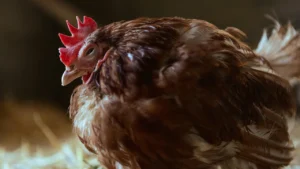Chickens are fascinating birds to watch with their beautiful plumage, quirky personalities and unique pecking order. At night they instinctively make their way to the coop where they sleep on an elevated roost high off the ground. This natural behavior keeps them safe from predators. As dusk falls they tuck themselves in and I do a quick headcount to make sure everyone is safely inside. Chickens rely on their excellent vision during the day but in the dark they need a little help finding their way. For baby chicks, a small light 24/7 is crucial for them to find their food and water ensuring their survival during those first few weeks.
How Do Chickens Sleep?
Chickens, like humans, experience different stages of sleep including rapid eye movement (REM) and non-REM sleep. During REM sleep they may show signs like twitching or making vocalizations, which could mean they’re dreaming. What’s fascinating is that chickens can sleep with one eye open keeping alert for predators. This happens because each eye is linked to the opposite side of the brain allowing one half to sleep while the other stays awake always aware of their surroundings.
At night, chickens prefer to sleep from dusk to dawn, aiming for about 8 hours of rest similar to humans. Their sleep habits are often influenced by seasons with their sleep cycles syncing with sunrise and sunset. However, in captivity artificial lighting can disrupt their natural sleep-wake cycles affecting their sleep quality. Factors like light noise and temperature can also impact how well they rest.
Where Do Chickens Like to Sleep?

Natural Instincts of Chickens
Chickens being social creatures, have an instinct to roost in safe elevated places to protect themselves from predators. They prefer sleeping high much like their wild ancestors.
Roosting Behavior and Preferences
When chickens sleep, they often roost on 2×12’s roosting bars or a stick, raised off the ground. This behavior mimics their natural need for safety as they stay away from the ground to avoid predators. They also like to huddle together, creating a tight-knit group which offers them both warmth and security.
Importance of Safe Sleeping Environment
A sturdy, predator-proof coop with ample space for all chickens is essential for their well-being. Providing a safe and secure environment allows chickens to feel protected as they sleep contributing to a healthy sleeping routine.
At What Time Do Chickens Sleep?
The time at which chickens sleep depends on various factors such as their schedule, personality and the time of year. Typically, chickens follow their instinctively natural rhythm sleeping when night falls and waking up at dawn breaks. During summer nights they may go to bed around 9 pm and wake up at 5 am. As the days get shorter in the winter their sleep cycle shifts and they might go to sleep earlier.
Chicken keepers often find it helpful to close the coop door at the same time every night to maintain consistency. However, some birds may sleep differently depending on their individual needs, and hens might ignore the rooster’s call if they are feeling a bit stubborn. Overall, chickens sleep better when the dark surrounds them, and their flock feels secure.
How High Should Chicken Roosts Be?
Chickens naturally prefer to sleep in the highest spot in the henhouse, and your roost should be positioned higher than the nesting boxes to keep them clean. I was once worried that my 5-foot-high roost might be too tall but even when they were only 2 months old my chickens were already flying up to it every night. They instinctively know where they feel safest and this height makes for an ideal sleep spot.
Factors Affecting Chicken Sleep
- Light, noise, and temperature influence chicken sleep quality.
- Artificial lighting can disrupt natural sleep-wake cycles, leading to poor sleep.
- Seasonal changes affect chickens’ sleep with longer days in summer reducing their rest.
- Providing a safe secure environment is crucial for healthy sleep.
- Comfortable surroundings help chickens rest effectively.
Tips for Ensuring Healthy Chicken Sleep
- Provide a predator-proof coop to keep chickens safe at night.
- Ensure the roosting bars are elevated and comfortable for easy sleeping.
- Keep the henhouse clean and free from dampness to prevent health issues.
- Maintain a quiet, dark environment during night hours to help chickens rest.
- Regulate the temperature inside the coop especially in winter, to ensure warmth.
- Avoid using artificial lighting that could disrupt their natural sleep patterns.
Chickens’ Nighttime Routine

At dusk, chickens instinctively return to their henhouse and settle on their roosts for the night. They stay there until the morning following their natural routine. With enough roosting space and proper height, they follow this pattern without any coaxing simply hopping onto the roosts as the first sign of nightfall appears. It’s fascinating to watch how they easily hop back to their safe spot to rest ready to start fresh the next day.
FAQs
1. Do chickens sleep on the ground?
Chickens prefer to roost on elevated surfaces not on the ground, as it keeps them safe from predators.
2. What time do chickens go to sleep?
Chickens naturally go to sleep at dusk as soon as the light starts to fade, and wake up with the sunrise.
3. Can chickens sleep with other animals?
Chickens can sleep with other animals, but it’s important to ensure they feel safe and secure in their coop to avoid stress.
4. Do chickens need a specific space to sleep?
Yes, chickens need enough roosting space with proper height to sleep comfortably away from potential threats.
5. Do chickens sleep standing up?
No, chickens sleep while perched on roosting bars, tucking their feet up and balancing on one leg.
Conclusion
When it comes to how chickens sleep they prefer to rest on elevated surfaces like a perch, usually placed high up in the coop. Chickens are instinctively capable of finding the right positions and height to ensure their safety throughout the night. From my experience, I’ve found that having enough space and the right roosting bars ensures that they sleep comfortably and securely.
As an owner, it’s essential to maintain a clean, dry environment so they are free from dampness. This allows your flock to sleep well without any issues, making their life easier and quite honestly, happier. By providing the right conditions good numbers of perches and the right height you will find that your chickens will willingly go to bed at night. Their instincts guide them to a peaceful restful night of sleep and as a result, you won’t need to worry about them sleeping standing up or in uncomfortable positions.












